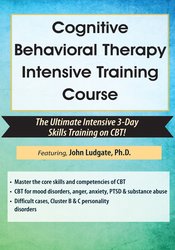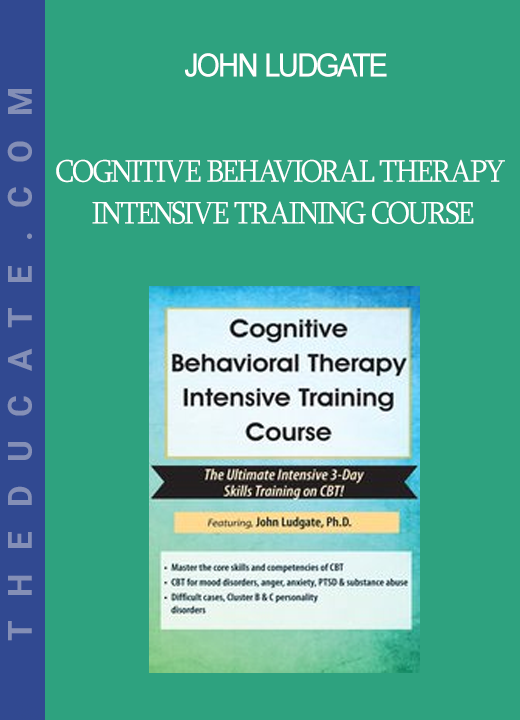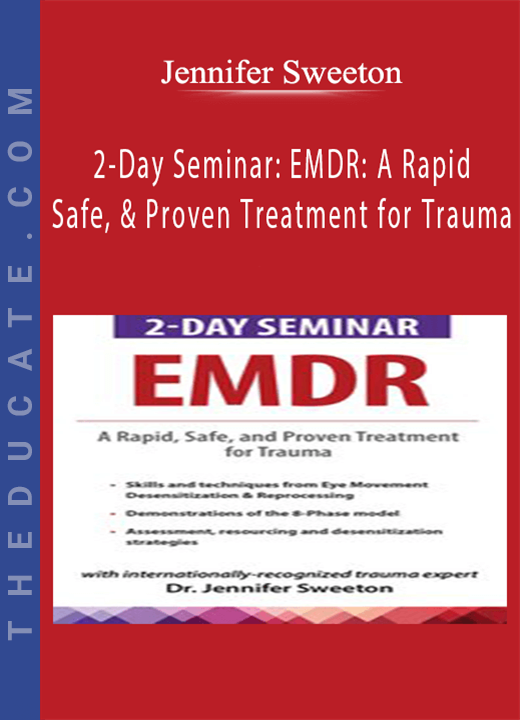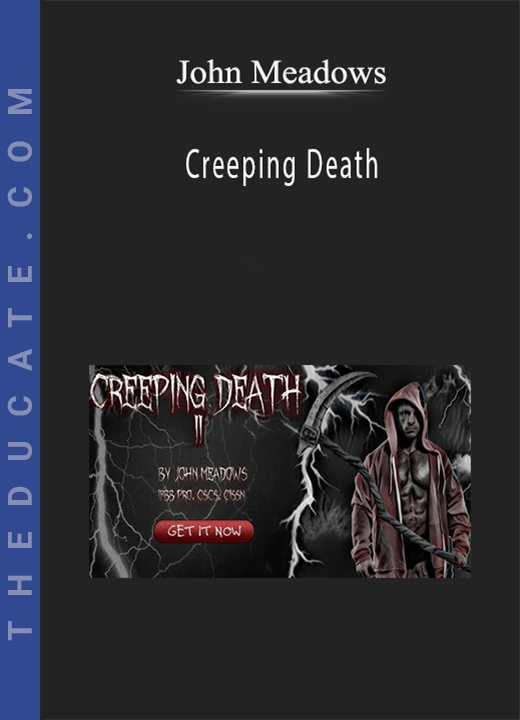Description

-
John Ludgate – Cognitive Behavioral Therapy Intensive Training Course
- Faculty:
- John Ludgate
- Duration:
- 18 Hours 1 Minutes
- Format:
- Audio and Video
- Copyright:
- Nov 29, 2017
Description
Join in for this breakthrough Cognitive Behavioral Therapy (CBT) Intensive Course to develop core competencies and transform your skills to achieve better therapeutic outcomes, even with your most challenging clients!
You will be able to utilize concrete strategies that will provide greater healing for your clients who suffer from:
- Mood disorders
- Anger
- Anxiety disorders
- PTSD
- Substance abuse
- Personality disorders
- Suicidality
- And many more challenging clients!
You’ll get effective clinical techniques from Dr. John Ludgate, a Founding Fellow of the Academy of Cognitive Therapy, and trained at the Center for Cognitive Therapy in Philadelphia under Cognitive Therapy’s founder Dr. Aaron Beck.
Through case studies, interactive discussions, role-plays, and reproducible handouts, you will take away practical CBT strategies to use immediately with any client. Leave this course armed with tools you can use in your very next session.
Handouts
| Manual – Cognitive Behavioral Therapy (5.8 MB) | 140 Pages | Available after Purchase |
Outline
Master the Core Skills and Competencies of CBT
Foundations in CBT
- Evolution of Cognitive Behavioral Therapies
- Neurobiological Findings
- Outcome Studies
Treatment Concepts
- Socialization to Treatment Model
- Levels of Cognition
- Eliciting & Labeling Distortions
- Identify & Evaluate Automatic Thoughts
Offshoot Models
- Third Wave Approaches
- DBT
- Acceptance & Commitment Therapy
- Schema Therapy
The Therapeutic Relationship
- Establish Rapport
- Ruptures in the Therapeutic Alliance
- Predictive of Outcome
Cognitive Conceptualization
- Case Formulation
- Collaborative Empiricism
- Symptom Driven Treatment Planning
Key Components of CBT Practice
- Structure
- Feedback
- Guided Discovery
- Collaborative Empiricism
- Homework
Application to Clinical Practice
- Case Studies/Role Plays
CBT for Mood Disorders, Anger, Anxiety, PTSD & Substance Abuse
CBT for Mood Disorders
- Cognitive Model of Depression
- Behavioral Activation
- Sleep Hygiene
- Activity Monitoring & Scheduling
- Modify Negative Cognitions
- Gratitude & Meaning
- Depressive Relapse
- Bipolar Disorder
CBT for Anger
- Cognitive Model of Anger
- Role of Values & “Moral Resistance”
- Symptom Management
CBT for Anxiety
- Generalized Anxiety
- Cognitive Model of Anxiety
- “Worry Cure”
- Phobias
- Hierarchy Work
- Desensitization
- Panic Disorder
- Cognitive Model of Panic
- Interoceptive Strategies
CBT for OCD
- Intrusive Thoughts
- Metacognitive Strategies
- Behavioral Experiments
CBT for PTSD
- Prolonged Exposure
- Cognitive Reprocessing
- Trauma Narratives
CBT for Substance Abuse
- Impulse Control Models
- Monitor Cravings & Resist Urges
- Relapse Prevention
Application to Clinical Practice
- Case Studies/Role Plays
Difficult Cases, Cluster B & C Personality Disorders
Overview of CBT for Challenging Cases
- Why are they challenging
- Adaptations in CBT
- Modified Expectations for the Therapist
Treatment Model
- Early Maladaptive Schemas
- Breaking Destructive Behavioral Cycles
- Belief Modification Protocol
CBT for Cluster B Personality Disorders
- Antisocial
- Psychopathy
- Behavior Management
- Narcissistic
- Subtypes of Narcissism
- Schema Mode Work
- Histrionic
- Schema Modification
- Constructive Alternatives for “Getting Noticed”
- Borderline
- DBT Based Strategies
- Emotion Regulation Skills
- Distress Tolerance Skills
- Interpersonal Effectiveness Skills
CBT for Cluster C Personality Disorders
- Modifying Avoidant Schemas and Strategies
- Changing Dependent Beliefs and Behaviors
- OCPD: Interventions and Strategies
Advanced Strategies for Cluster B Personality Disorders
- Modify Deep Seeded Beliefs
- Continuum Work
- Construct New Beliefs
- Internalization Exercises
- Build Resilience
- Cognitive Behavioral Chain Analysis
- Schema Mode Work
CBT for Suicidal Clients
- CBT Model of suicide
- Risk Assessment
- Strategies for Suicidal Ideation and Hopelessness
- Reasons for Living Inventories
Please Note: PESI is not affiliated or associated with Marsha M. Linehan, PhD, ABPP, or her organizations.
Faculty

John Ludgate, Ph.D. Related seminars and products: 7
Licensed Psychologist/Psychotherapist
Private Practice
John Ludgate, Ph.D., is a licensed clinical psychologist who has worked as a psychotherapist for almost 30 years. He is a Founding Fellow of the Academy of Cognitive Therapy. His practice, which involves work in both a private practice and in an outpatient psychiatric center, consists largely of treating clients referred with mood problems and/or anxiety conditions. He is currently working at the Cognitive-Behavioral Therapy Center of Western North Carolina in Asheville, North Carolina.
John is a native of southern Ireland and obtained a Master Degree in Clinical Psychology from the University of Edinburgh in Scotland, and a Ph.D. from Trinity College, Dublin, Ireland in 1990. He trained at the Center for Cognitive Therapy in Philadelphia under Dr. Aaron Beck, the founder of Cognitive Therapy, obtaining a Post-Doctoral Fellowship in Cognitive Therapy from the University of Pennsylvania in 1986. He subsequently became assistant director of training at Dr. Beck’s Center.
In the early 1990’s, Dr. Ludgate was a research clinical psychologist at the University of Oxford in England and served as cognitive therapist in several outcome studies of panic disorder, agoraphobia, social phobia and hypochondriasis. He authored Cognitive Behavioral Therapy and Relapse Prevention for Depression and Anxiety (Professional Resources Press, 2009) and was co-editor with Wright, Thase and Beck of Cognitive Therapy with Inpatients: Developing a Cognitive Milieu (Guilford Press, 1993). His other books include Overcoming Compassion Fatigue (PESI, 2014 co-authored with Martha Teater and The CBT Couples Toolbox (PESI, 2018). He has written numerous journal articles and book chapters in the field of Cognitive Behavior Therapy for Anxiety and Depression. He has presented many seminars and workshops on cognitive behavioral approaches, both nationally and internationally.
Speaker Disclosures:
Speaker Disclosures: Financial: John Ludgate has an employment relationship with Cognitive Behavioral Therapy Center of WNC. He receives a speaking honorarium from PESI, Inc.
Non-financial: John Ludgate has no relevant non-financial relationship to disclose.







Reviews
There are no reviews yet.